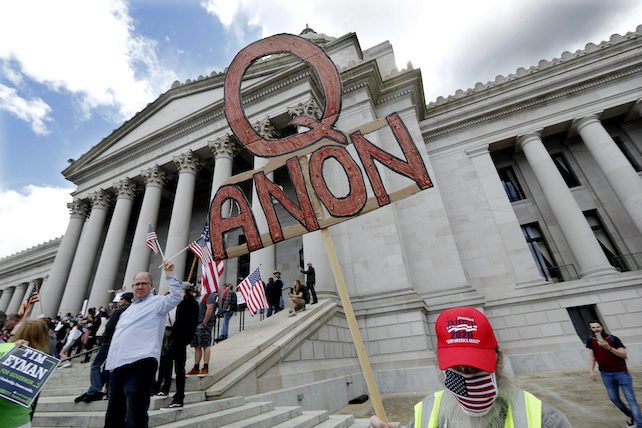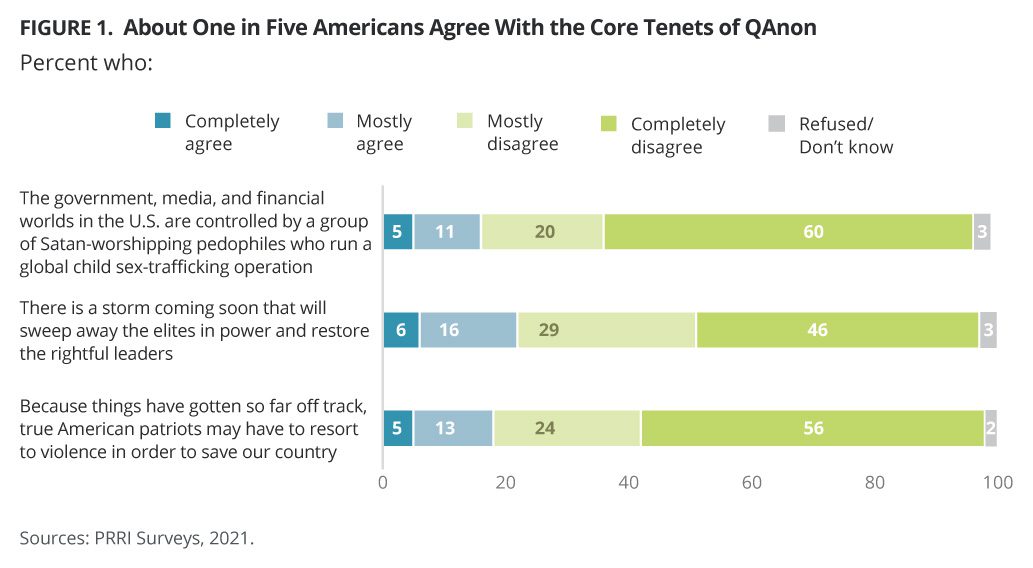(RNS) — A new study finds devotees of the conspiracy theory movement known as QAnon number in the tens of millions, a sizable coalition that claims a number of white evangelicals but draws from other religious groups as well.
And while QAnon believers are vastly outnumbered by those who reject or doubt their claims, researchers say they represent a politically motivated worldview that diverges sharply from the views of other Americans when assessing current events, such as the Jan. 6 attack on the U.S. Capitol last year.
The study, compiled from a series of surveys conducted by the Public Religion Research Institute in 2021, gauged Americans’ attachment to QAnon, whose followers are often loyal to former President Donald Trump, by asking whether respondents agreed with three statements associated with the movement:
The government, media and financial worlds in the U.S. are controlled by a group of Satan-worshipping pedophiles who run a global child sex-trafficking operation.
There is a storm coming soon that will sweep away the elites in power and restore the rightful leaders.
Because things have gotten so far off track, true American patriots may have to resort to violence in order to save the country.
Those who completely or mostly agreed with these statements were dubbed QAnon believers, those who mostly disagreed were described as doubters and those who completely disagreed as rejecters. Researchers discovered 16% of American adults — roughly 41 million people — were QAnon believers, while 48% were QAnon doubters and 34% rejecters.
Their numbers, researchers noted, remained relatively stable throughout 2021.
“Our surveys show that QAnon conspiracy theories are not losing popularity over time, despite their championed leader being out of power,” said Natalie Jackson, director of research at PRRI, in a press release. “While these believers are racially, religiously, and politically diverse, the unifying beliefs are that their way of life is under attack and that they might be willing to resort to violence to defend their vision of the country.”
QAnon has long been associated with a vocal subset of white evangelical Protestants, and the PRRI report found the largest chunk of QAnon devotees are indeed white evangelicals (20%). But the rest of the conspiracy theory-driven coalition represents a relatively diverse array of faith groups: Religiously unaffiliated Americans constitute 17% of QAnon believers, followed by white mainline (nonevangelical) Protestants (12%), white Catholics (12%), Hispanic Catholics (10%), Black Protestants (8%), Hispanic Protestants (6%) and other, non-Christian religions (6%). Members of other Christian denominations only make up a small sliver of the group (3%), along with other Protestants of color (3%) and other Catholics of color (2%).
Hispanic Protestants, a small but growing percentage of the population, were the most likely religious group to find QAnon believers in their ranks (27%). White evangelicals were next (23%), followed by Jehovah’s Witnesses (23%), Protestants of color (21%), Hispanic Catholics (18%), Black Protestants (17%), Latter-day Saints (17%), Buddhists (17%), other Catholics of color (15%), white Catholics (14%) and white mainline (nonevangelical) Protestants (14%).


